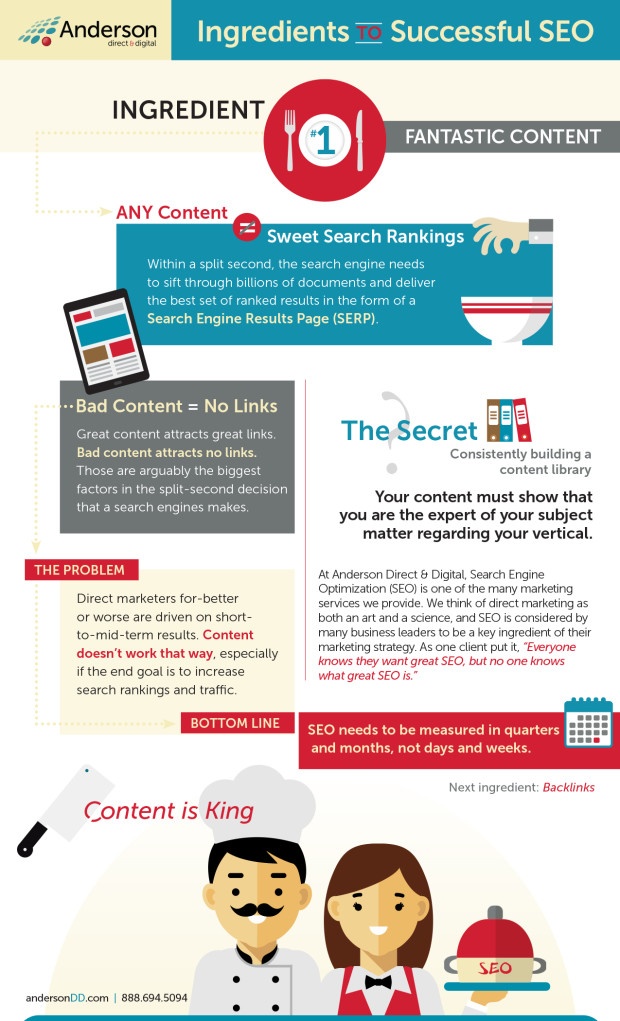At Anderson Direct & Digital, Search Engine Optimization (SEO) is one of the many marketing services we provide to our clientele. We think of direct marketing as both an art and a science, and in terms of difficulty it’s easy to say that SEO is considered by many business leaders to be a form of marketing black magic. As one client I worked with years ago put it, “Everyone knows they want great SEO, but no one knows what great SEO is.”
The truth is that SEO is actually pretty straightforward and hasn’t changed all that much in the past decade. That’s why we’ve decided to celebrate a month of SEO posts taking a deeper dive into the 4 ingredients to a successful SEO campaign.
Without further ado, here is the first ingredient:
Ingredient 1: Content. Great Content. Amazing, stunning, absolutely fantastic content.
If you’re even tangentially familiar with SEO, content being the number one ingredient to success shouldn’t be a surprise. “Content is king” is a familiar phrase that I’ve personally heard hundreds, if not thousands of times in my career in digital.
The biggest problem is that a lot of companies make the mistake of thinking that any content can help them break through the ranks and gain a ton of sweet search traffic. That couldn’t be further from the truth. Every single time a user visits a search engine and types in a keyword phrase, the search engine needs to, within a split second, sift through billions of documents and deliver the best set of ranked results to the end user in the form of a Search Engine Results Page (SERP). You’ve seen this page thousands upon thousands of times, and most likely take for granted that you literally have the world’s digital knowledge at your fingertips.
The relationship between great content is directly tied to links, which will be next week’s ingredient we cover. Great content attracts great links. Bad content attracts no links. Those are arguably the largest driver in the split-second decision that search engines use.
Therein lies the problem: Direct marketers are, for better or worse, driven on short- to mid-term results. Drop a direct mail campaign, measure results over the next two months. Set up a paid search campaign, watch the daily lead flow come in.
Content doesn’t work that way, especially if the end goal is to increase search rankings and traffic. While we can also touch on the popular opinion that great content should be created for the sake of itself, I’ll skip over that since we’re talking about companies wanting a coherent SEO strategy to act against.
Here’s the bottom line with content: Anything that you expertly craft today will likely not deliver organic traffic for a long, long time, especially if you’re just starting with SEO. One thing we commonly tell clients is that the success of SEO needs to be measured in months and quarters, not days and weeks.
We’re going to look at a real world example of how great content along with a long-term view of success paid off: Edmunds.com, which provides automotive reviews, information, and vehicle listings. While the site itself dates all the way back to the ‘90s, they have over time proven to be masters at bending search engines to their will.
Their secret? Consistently building their content library.
Want to see how successful they are? Take a minute, hop on over to Google, and type in “[year] [make] [model] review,” substituting whatever you want, e.g., “2008 Toyota Tacoma review” or “2002 Audi A4 review.” You can run 100 or 1,000 of these queries, and you’ll see that Edmunds is the number one player in the automotive review space, very rarely showing up in a number two or number three position in search results.
This is the level of competition you will see in a variety of verticals, and while your company SEO goals may be regional or local in nature (compared to Edmunds national reach), the mandate is the same: Your content must show you to be the subject matter expert regarding your vertical.
Edmunds is the perfect example of a long-term view of search dominance. They write expert reviews for every single vehicle that is made. That’s thousands upon thousands of articles, photos, and other vehicle data that they’ve compiled over 20+ years, and that’s the definition of great content.
When creating a content strategy, also consider that search engines continue to move towards the concept of semantically related content—that is, content that is surrounded by complementary subjects. I’ve written elsewhere that this is the driver behind Wikipedia’s massive amount of search traffic. Across millions of content pieces, there are millions of links to related subjects. If you’re on a page about your favorite actor, the Wikipedia article links to their filmography, notable relatives, and other work. This in turn tells the engines that not only is Wikipedia an expert on “Subject A,” but can also provide a great user experience by having expertise around “Subject A1,” “Subject A2,” and so forth.
Next week: Backlinks






